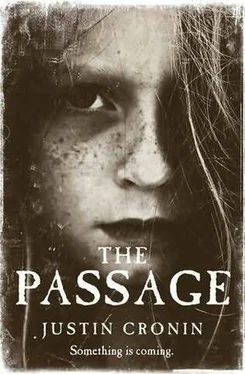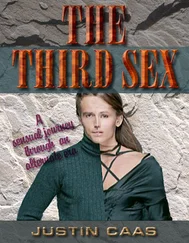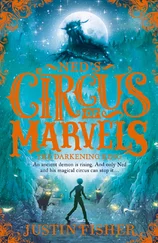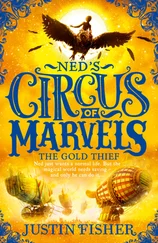That night, sitting in his chair by the door with the Springfield in his hand, he dreamed of Lila. Part of him knew this was a dream about sex, about making love, and yet it did not seem so. Lila was pregnant, and the two of them were playing Monopoly. The dream had no particular setting-the area beyond the place where the two of them sat was veiled in darkness, like the hidden regions of a stage. Wolgast was gripped by the irrational fear that what they were doing would hurt the baby. “We have to stop,” he told her urgently. “This is dangerous.” But she seemed not to hear him. He rolled the dice and moved his piece to find he had landed on the square with the image of the policeman blowing his whistle. “Go to jail, Brad,” Lila said, and laughed. “Go directly to jail.” Then she stood and began taking off her clothes. “It’s all right,” she said, “you can kiss me if you want. Bob won’t mind.” “Why won’t he mind?” Brad asked. “Because he’s dead,” Lila said. “We’re all dead.”
He awoke with a start, sensing he wasn’t alone. He turned in his chair and saw Amy, standing with her back toward him, facing the wide windows that looked toward the lake. In the glow of the woodstove, he watched as she lifted a hand and touched the glass. He rose.
“Amy? What is it?”
He was stepping forward when a blinding light, immense and pure, filled the glass, and in that instant Wolgast’s mind seemed to freeze time: like a camera shutter his brain caught and held a picture of Amy, her hands lifting against the light, her mouth open wide to release its cry of terror. A rush of wind shook the cabin, and then, with a concussive thump, the windows burst inward and Wolgast felt himself lifted off the floor and hurled back across the room.
One second later, or five, or ten: time reassembled itself. Wolgast found himself on his hands and knees, pushed against the far wall. Glass was everywhere, a thousand pieces of it on the floor, their edges twinkling like shattered stars in the alien light that bathed the room. Outside, a bulbous glow was swelling the horizon to the west.
“Amy!”
He went to where she lay on the floor.
“Are you burned? Are you cut?”
“I can’t see, I can’t see!” She was thrashing violently, waving her arms in formless panic before her face. There were pieces of glass glimmering all over her, affixed to the skin of her face and arms. And blood, too, soaking her T-shirt as he leaned over her and tried to calm her.
“Please, Amy, hold still! Let me look to see if you’re hurt.”
She relaxed in his arms. Gently he brushed the bits of glass away. There were no cuts anywhere. The blood, he realized, was his own. Where was it coming from? He looked down then to find a long shard, curved like a scimitar, buried in his left leg, halfway between his knee and groin. He pulled; the glass exited cleanly, without pain. Three inches of glass in his leg. Why hadn’t he felt it? The adrenaline? But as soon as he thought this, the pain arrived, a late train roaring into the station. Motes of light dappled his vision; a wave of nausea surged through him.
“I can’t see, Brad! Where are you!”
“I’m here, I’m here.” His head was afloat in agony. Could you bleed to death from a cut like that? “Try to open your eyes.”
“I can’t! It hurts!”
Flash burns, he thought. Flash burns on the retina, from looking into the heart of the blast. Not Portland or Salem or even Corvallis. The explosion was straight west. A stray nuke, he thought, but whose? And how many more were there? What could it accomplish? The answer, he knew, was nothing; it was just one more violent spasm of the world’s excruciating extinguishment. He realized that he’d allowed himself to think, when he’d stepped out into the sun and tasted spring, that the worst was behind them, that they would be all right. How foolish he’d been.
He carried Amy to the kitchen and lit the lamp. The glass in the window over the sink had somehow held. He sat her on a chair, found a dishrag, and quickly tied it around his wounded leg. Amy was crying, pressing her palms to her eyes. The skin of her face and arms, where she’d faced the blast, was a bright pink, already beginning to peel.
“I know it hurts,” he told her, “but you have to open them for me. I have to see if there’s any glass in there.” He had a flashlight on the table, ready to scan her eyes the moment she opened them. An ambush, but what else could he do?
She shook her head, pulling away from him.
“Amy, you have to. I need you to be brave. Please.”
Another minute of struggle, but at last she relented. She let him pull her hands away and opened her eyes, the thinnest crack, before closing them again.
“It’s bright!” she cried. “It hurts!”
He struck a bargain with her: he would count to three; she would open her eyes and keep them open for another count of three.
“One,” he began. “Two. Three!”
She opened her eyes, every muscle in her face taut with fear. He began to count again, running the flashlight’s beam over her face. No glass, no trace of visible injury: her eyes were clear.
“Three!”
She closed her eyes again, shaking and fiercely weeping.
He dressed Amy’s skin with burn cream from the first aid kit, wrapped her eyes with a bandage, and carried her upstairs to bed. “Your eyes are going to be fine,” he assured her, though he didn’t know if this was so. “I think it’s just temporary, from looking at the flash.” For a while he sat with her, until her breathing quieted and he knew she was asleep. They should try to get away, he thought, to put some distance between themselves and the blast, but where would they go? First the fires and then the rain, and the road off the mountain had all but washed away. They could try it on foot, but how far could he hope to get, barely able to walk himself, leading a blind girl through the woods? The best he could hope for was that the blast was small, or farther away than he thought it was, or that the wind would push the radiation in the other direction.
In the first aid kit he found a small sewing needle and a ball of black thread. It was just an hour before dawn when he descended the stairs to the kitchen. At the table, by lamplight, he removed the knotted rag and his blood-soaked pants. The cut was deep but remarkably clean, the skin like torn butcher’s paper over a blood-red slab of steak. He’d sewed on buttons, once hemmed a pair of his pants. How hard could it be? From the cabinet over the sink he retrieved the bottle of Scotch he’d found at Milton ’s, all those months ago. He poured himself a glass. He sat and took the Scotch, quickly, tipping his face back to drink without tasting, poured a second, and drank that, too. Then he rose, washed his hands at the kitchen sink, taking his time, and dried them on a rag. He sat once more, wadded the rag, and put it in his mouth; he took the bottle of Scotch in one hand and the threaded needle in the other. He wished he had more light. He drew a long breath and held it. Then he poured Scotch over the cut.
This, it turned out, was the worst part. After that, sewing the wound closed was almost nothing.
He awoke to find he’d slept with his head on the table; the room was ice-cold, and the air held a strange chemical smell, like burning tires. Outside a gray snow was falling. On his bandaged leg, throbbing with pain, Wolgast hobbled from the lodge onto the porch. Not snow, he realized: ashes. He descended the steps. Ashes fell onto his face, into his hair. Strangely, he felt no fear, not for himself or even for Amy. It was a wonder. He tipped his face upward, receiving them. The ashes were full of people, he knew. A raining ash of souls.
***
He could have moved them to the basement, but there seemed no point. The radiation would be everywhere, in the air they breathed, in the food they ate, in the water that ran from the lake to the pump in the kitchen. They kept to the second floor, where at least the boarded-up windows offered some protection. Three days later, the day he removed Amy’s bandages-she could see after all, just as he’d promised-Wolgast began to vomit and couldn’t stop. He wretched long after the only thing left to come up was a thin black mucus, like roofing tar. The leg was infected, or else the radiation had done something to it. Green pus ran from the wound, soaking the bandages. It gave off a foul smell, a smell that was in his mouth too, in his eyes and nose. It seemed to be in every part of him.
Читать дальше












